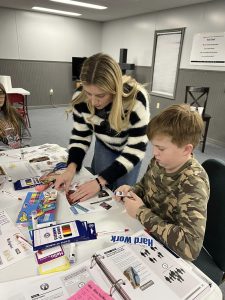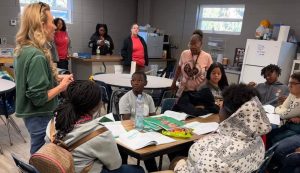Children in Taylor County, like those in many rural and low-income communities, face unique challenges that can limit their potential to thrive. Risk factors such as limited access to resources, economic instability, and exposure to adverse environments often place youth on a trajectory toward risky behaviors and poor health outcomes. To combat these challenges, implementing the PROSPER Botvin LifeSkills Training Program at the elementary school level is not just beneficial—it is essential.
Addressing Critical Needs with Proven Solutions
The Botvin LifeSkills Training (LST) Program, the backbone of the PROSPER initiative, is backed by over 40 years of peer-reviewed research and is recognized as the top evidence-based substance abuse prevention program in the nation. Its focus on building social and emotional skills, self-management, and drug resistance uniquely positions it to address the multifaceted needs of Taylor County youth.
The Case for Early Intervention
The earlier children are exposed to critical life skills, the greater their chances of making healthier choices and achieving lifelong success. Studies confirm that consistent, repeated exposure to these lessons during formative years significantly enhances outcomes. By introducing this program to fifth graders, Taylor County schools provide a foundation for informed decision-making and resilience at a pivotal stage in development.
Documented Effectiveness
Research highlights the program’s ability to make tangible, life-changing impacts. For example:
- Substance Use Prevention:
- Cuts tobacco use by 87%
- Reduces alcohol use by 60%

- Lowers marijuana use by 75%
- Reduces methamphetamine use by 68%
- Decreases polydrug use by 66%
- Behavioral Benefits:
- Reduces violence and risky driving behavior
- Demonstrates positive effects on HIV risk behavior
- Reduces bullying (both in-person and cyberbullying) when paired with digital learning tools
A study involving 14 schools found that LST not only reduced bullying behaviors but also improved students’ life skills knowledge and emotional competence. These results underscore the program’s versatility and adaptability in addressing various youth challenges.
Impact in Low-Income Communities
Rural counties like Taylor often face heightened risks due to economic disparities. According to national research, youth in low-income areas are more likely to:
- Experiment with tobacco, alcohol, and drugs earlier
- Struggle with mental health issues, including stress and anxiety
- Experience limited exposure to positive role models and life skills education
The LST program directly addresses these gaps by equipping students with practical tools for managing emotions, resisting peer pressure, and building self-esteem. By implementing this program at a young age, Taylor County can break cycles of poverty and risk-taking behavior, setting its youth on a trajectory toward thriving.
 Alignment with Department of Education Requirements
Alignment with Department of Education Requirements
As an evidence-based initiative, the LST program aligns with the Casel state and federal requirements for substance abuse prevention and emotional development curricula. Its integration into the elementary school system ensures compliance with these mandates while delivering measurable outcomes for students.
Building a Brighter Future for Taylor County
Taylor County’s PROSPER Bottom LifeSkills Program provides an unparalleled opportunity to invest in the well-being of its youth. By fostering social, emotional, and decision-making skills, the program empowers children to envision and pursue brighter futures. 4-H Agent Abbey Tharpe and her program assistant Rachel Story’s dedication to this cause exemplifies how education can transform communities, one classroom at a time.
To learn more about the program or to get involved, contact the Taylor County Extension Office. Together, we can build a foundation for healthier, happier, and more successful generations.
Cited:
Archives of Pediatric & Adolescent Medicine (2006).
 1
1

